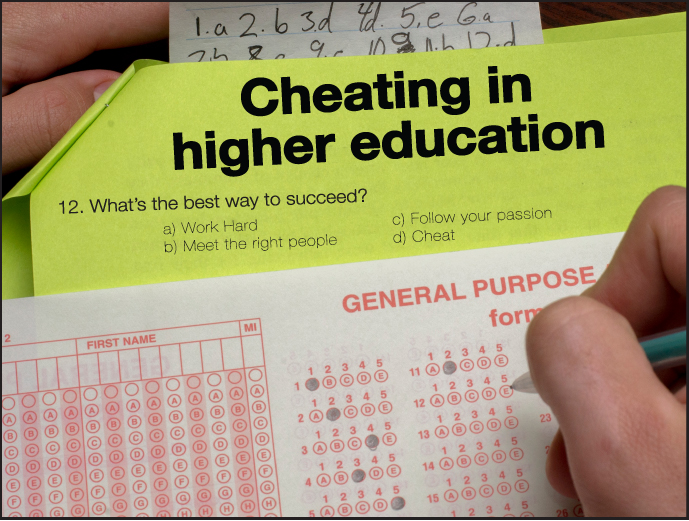
It’s printed on every syllabus a student receives at the beginning of a semester: Saint Louis University’s “Academic Integrity Policy.” “The University is a community of learning, whose effectiveness requires an environment of mutual trust and integrity,” it reads. While the causes of academic dishonesty are varied and often debated, what cannot be debated is its prevalence on college campuses across the country. Statistics and studies vary, but consistently report that anywhere from 50 percent to 75 percent of college students admit to cheating, and it has become more pervasive in recent years. But how prevalent is it at SLU, and in what form does it most often manifest itself?
“I don’t think [cheating] is a common occurrence, but it definitely happens,” a senior biomedical engineering major said.
“I wouldn’t say it’s prevalent, but it does occur, mainly in bigger classes,” a senior biology and pre-medical student said.
This pre-medical student talked specifically about the physics class pre-medical students are required to take and the cheating that became widespread in the class.
“It was such a difficult class, and adoes occur, mainly in bigger classes,” a senior biology and pre-medical student said.
This pre-medical student talked specifically about the physics class pre-medical students are required to take and the cheating that became widespread in it.
“It was such a difficult class, and a lot of people didn’t do well first semester. Second semester, people really started cheating a lot- it was rampant by the end of the year,” she said.
“Everyone wants to get that A and that perfect GPA, so there’s a drive to do anything to get that grade,” she added.
This illustrates a trend seen nationwide; while academic dishonesty has traditionally been associated with students struggling to get by, it has recently been associated with high-achieving groups as well. Whether it be high school students striving to get into an elite university or college students hoping to get into medical or law school, cheating has become more common.
Harvard University made national news in 2012 when a widespread cheating scandal involving 125 students was revealed. The students copied answers on a take-home exam, and the incident sparked conversation around the country.
“In classes where people don’t cheat, there isn’t a need to. Professors teach the content well and students can really study for what’s going to be on the exam,” said this pre-medical student. “Compare that to a class where kids can attend lecture, take notes, study hard, and the exam doesn’t reflect anything you learned in class; it becomes frustrating and kids start to cheat.”
Jonathon Zimmerman, chair of humanities and social services at New York University and frequent commentator on higher education, has expressed a similar view.
“As educational researchers have repeatedly demonstrated, students are more likely to cheat when they feel disengaged,” he wrote in the wake of the Harvard scandal. “If you think your professor doesn’t care whether you’re learning, you probably won’t care either.”
The biomedical engineering student echoed these sentiments.
“There are little forms of what is technically cheating, like copying homework, that go on a lot. Usually that’s only for assignments that are more busywork than actual learning though,” he said. “There are times when people will pass around past versions of tests they’re not supposed to have, but I don’t know if I would consider that cheating.”
In addition to disengaged professors, research suggests that classroom and campus environment are contributors to cheating; those with more tight-knit social circles, whether it be as members of Greek life, athletic teams, or in other student organizations, are more likely to cheat. If cheating is viewed as “acceptable” on campus or a class is hyper-competitive, it becomes more common; cheating begets cheating.
While SLU’s Academic Integrity Policy works to stem dishonesty before it begins, the University is continually looking for new ways to enforce the policy and maintain SLU’s community of integrity.
“The most frustrating thing about that physics class was that someone went to the professor, telling him that people are cheating,” the pre-medical student said. “Over the summer, they asked people who knew that cheating occurred to come forward and testify; but people would know your name, So the issue ended up being dropped.”
While she says strategies ranged from “trading Scantrons or motioning answers to each other,” no one ended up being punished.
While incidences like this are rare, they are not unnoticed, and the administration makes efforts to prevent them in the future.
Individual events of academic integrity are addressed by the academic units involved, but an Academic Integrity Task Force has been created that will be charged with “developing an academic integrity policy that can apply University-wide and guide unit policies,” according to Dr. Lisa Dorsey, Associate Vice President of Undergraduate Education.
“The mission of Saint Louis University is the pursuit of truth,” reads SLU’s mission statement. Academic dishonesty cuts to the very core of this pursuit of truth; and yet it continues to become more common.






Velvet Nelson • Dec 12, 2013 at 12:43 pm
What can schools do make professors care more about cheaters? Does it require incentives? Or less workload so they can concentrate on engaging more with the class and students?